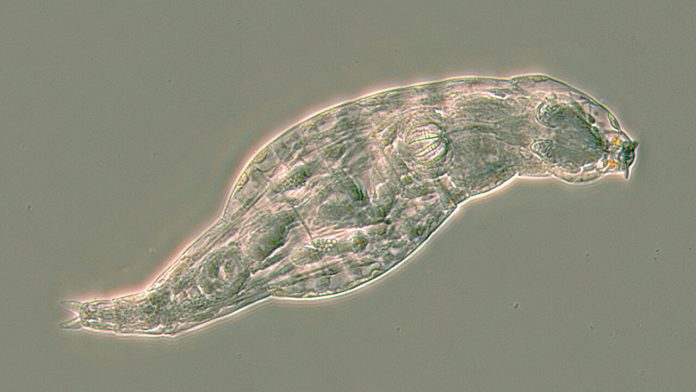
A recent study from the University of Oxford, the University of Stirling, and the Marine Biological Laboratory (MBL) has uncovered that small freshwater animals called bdelloid rotifers use genes borrowed from bacteria to protect themselves from infections.
Bdelloid rotifers are tiny creatures smaller than a strand of hair. They have a head, mouth, gut, muscles, and nerves, much like other animals.
Researchers found that when these rotifers face fungal infections, they activate hundreds of genes taken from bacteria and other microbes.
These genes help the rotifers produce antibiotics and other antimicrobial agents to fight off the infections.
This study was published in Nature Communications.
Lead author Chris Wilson from the University of Oxford explained that the researchers were surprised when they analyzed the DNA. They found that the genes were producing chemicals similar to antibiotics, which are typically made by bacteria, not animals.
Previous research showed that rotifers have been absorbing DNA from their environment for millions of years. However, this is the first study to reveal that they use these borrowed genes to combat diseases. No other animals are known to acquire genes from microbes on such a large scale.
David Mark Welch, a co-author from MBL, pointed out that some of these borrowed genes have evolved within the rotifers. This could mean that rotifers are making new antimicrobial substances that might be safer for animals, including humans, than traditional antibiotics developed from bacteria and fungi.
Antibiotics are crucial in modern medicine, but most are naturally produced by fungi and bacteria. Humans then create synthetic versions for medical use. This study suggests that rotifers might be using a similar method by copying DNA from microbes to make their own antibiotics.
Wilson mentioned that they observed rotifers using one of these genes against a fungal infection. The rotifers that survived produced ten times more of the antibiotic than those that died, showing its effectiveness in fighting the disease.
This discovery could be important in the search for new antibiotics, especially as many current antibiotics are becoming less effective due to resistance. The World Health Organization recently highlighted the urgent need for new antibiotics to combat this growing issue.
Reuben Nowell from the University of Stirling noted that the genes in rotifers have changed over time, possibly creating new and different chemicals. This could inspire new ideas for future medicines.
The next step in the research involves identifying the various antibiotic peptides produced by rotifers and understanding the conditions that trigger their production.
One mystery is why rotifers are the only animals to borrow so many genes from microbes. Tim Barraclough from Oxford suggests it might be related to the fact that bdelloid rotifers reproduce asexually, meaning they don’t need males and produce clones of themselves. This lack of genetic diversity might drive them to acquire new genes to stay healthy and avoid extinction.
Nowell believes there is much more to discover about rotifers and their borrowed DNA, which could lead to significant advancements in medicine.
If you care about health, please read studies about how Mediterranean diet could protect your brain health, and the best time to take vitamins to prevent heart disease.
For more health information, please see recent studies that olive oil may help you live longer, and vitamin D could help lower the risk of autoimmune diseases.



